The State, Democracy and Dictatorship
1/23
Earn XP
Description and Tags
Week 2
Name | Mastery | Learn | Test | Matching | Spaced |
|---|
No study sessions yet.
24 Terms
David Easton’s concept of Political System
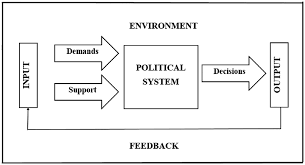
what is a state
monopoly of legitimate violence (war makes states and states make war)
territory
sovereignty
some also include
plurality (or ‘anarchy’ in international relations)
a certain relation (‘regime’) between:
political elite and state institutions, on the one hand
and population and citizens, on the other
→ leads to: administrative legal order (constitutions, laws, rights, policies, etc.)
what is a nation state
Monopoly of legitimate violence
Territory
Sovereignty
but also:
Political community
Citizenship
Legal relationship subject – state
Equality before the law
Nationhood
From: blood
To: “an imagined political community” (Benedict Anderson 1991: 6)
Westphalian order: Peace of Westphalia (1648)
Each state has sovereignty over its territory and domestic affairs
No interference in other states’ internal affairs
Equality among states in international law
failed states (and examples)
impaired state like entities
weak, competing, or non-existing governments
not exactly sovereign in practice, weak regime acceptance
cannot exercise rule over their inhabitants
examples: chad, somalia, libya, sudan (all unable to control inhabitants across their territory)
→ no security (due to no monopoly on violence)
→ no legitimacy
indicators of fragile states
fractionalised elites
weak economy
immigration
autocratic regimes
have no (or hardly any) executive turnover
are therefore non-polyarchies
fully authoritarian regimes have been in decline over time
→ BUT: authoritarian can be remarkably durable
what keeps authoritarian leaders in place
repression
building legitimacy
to be able to calculate their opposition’s moves
want to seem as a ‘good’ regime
education policies/ propaganda
co-opting groups/ elites
can backfire when the regime misjudges the strength of the opposition
creating the illusion of power and influence
getting them on their side
elections
gives them legitimacy
can handpick the opposition with a huge electoral victory - seems as though they have the public’s support
international relations
no intervention/ interference from others to keep international peace
Robert Dahl’s view on democracy
two dimensions:
contestation
procedures of democratic competition
inclusion
who has the right to participate in politics
minimalist view
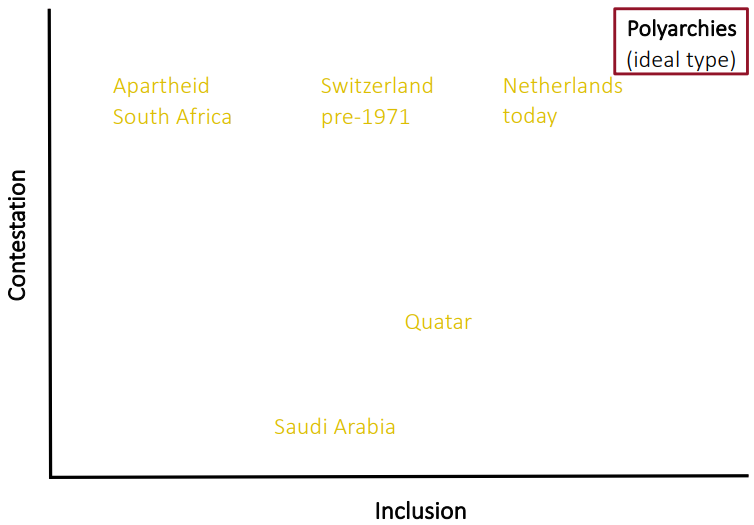
minimalist view of regime type
Institutions and procedures matter, not the outcomes
Focus on electoral contestations for political office
substantive view of regime type
includes minimalist view and adds:
outcomes as a forms of classification
includes outcomes in terms of values
e.g. freedom, rights, …
(as in David Easton’s complete model)
measures of democracy
DD (democratic-dictatorships measure)
polity IV
freedom house
DD (democratic-dictatorships measure)
minimalist
dichotomous
four criteria of classification:
the chief executive is elected
the legislature is elected
There is more than one party competing in the elections
a. Ex ante uncertainty
b. Ex post irreversibility
c. Repeatability
An alternation in power under identical electoral rules has taken place
polity IV
minimalist
continuous
(democracies are classified from a minimum of -10 (as autocratic or dictatorial as possible) to a maximum of 10 (as democratic as possible))
A country’s polity score is based on five attributes:
The competitiveness of executive recruitment
The openness of executive recruitment
The constraints that exist on the executive
The regulation of political participation
The competitiveness of political participation
number 3 is special because it wasn’t mentioned by Dahl and introduces checks and balances
freedom house
substantive
continuous
measures a country’s freedom based on two dimensions:
a country’s level of civil rights (15 questions)
four sub-categories:
freedom of expression and belief
associational and organizational rights
rule of law
personal autonomy and individual rights
a country’s level of political rights (10 questions)
three sub-categories
electoral process
political pluralism and participation
functioning of government
type of conceptualisations of regime types
dichotomous and continuous
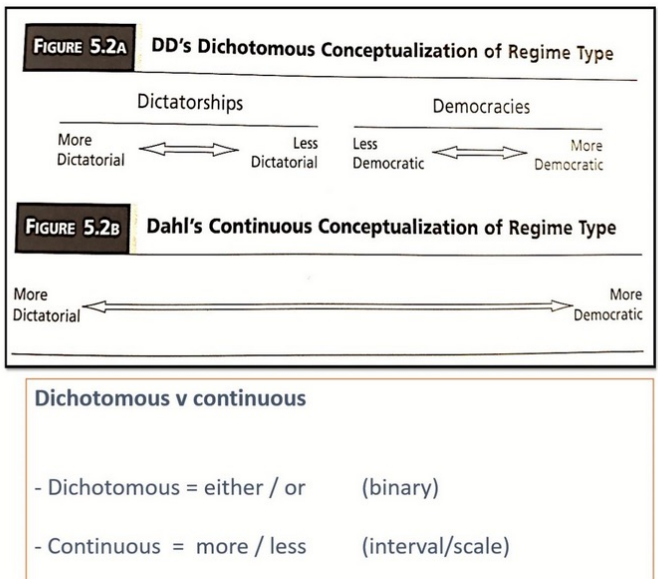
dichotomous conceptualisation
a dichotomous view examines dictatorships and democracies separately
→ there are two discrete categories
people using this think that it is impossible/ senseless for a country to be equally dictatorial and democratic, as it would be possible in the continuous view
they also believe that countries with uncontested political offices (china, north korea) should not be considered partly democratic at all
(example of pregnancies - either pregnant or not)
binary → either/ or

continuous conceptualisation
in a continuous view, one assumes that there is only one range between more dictatorial and more democratic
→ intermediate value
many people believe that politics: “democracy is always a matter of degree” (Bollen and Jackman, 1989:618)
interval/ scale → more/ less

what makes indicators or measures more desirable than others in research?
validity
transparency
reliability
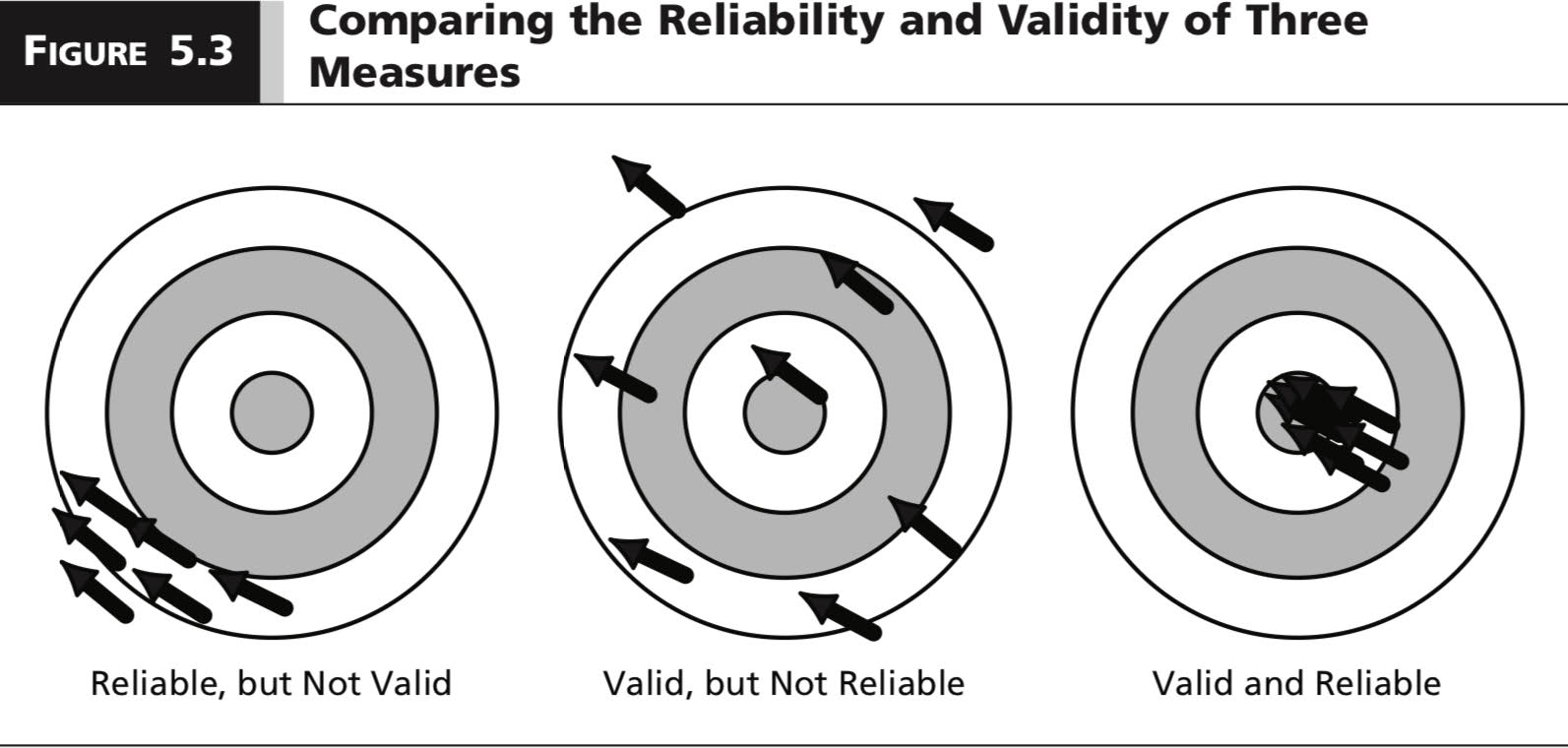
validity
= the extend in which our measures reflect the concepts they are intended to correspond to
in minimalist measures (polity IV and DD):
do not capture everything
in substantive measures (freedom house):
too many attributes with which one can’t come to a clear conclusion/ finding
transparency
⇒ replicability of the process by a third party
DD and polity IV are easier to replicate
freedom house doesn’t show their process/ coding rules → makes replication difficult
reliability
= the extent in which measurements can be repeated and produce the same outcome, even when conducted by third parties
DD is the more reliable measure
polity IV and freedom house rely on subjective judgements
modernisation theory
→ predicts that democracy is more likely to emerge and survive as countries develop and become richer
(both: more likely to survive in wealth and more likely to become democratic, if not yet, through wealth)
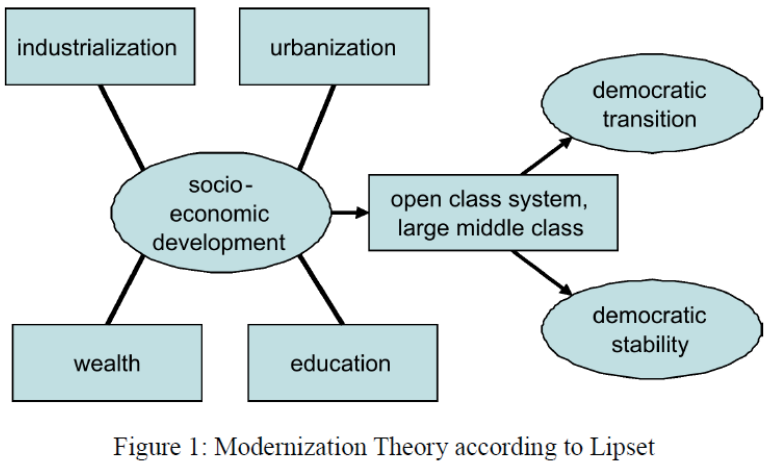
survival theory
→ predicts that democracy is more likely to survive as countries develop and become richer but not more likely to emerge